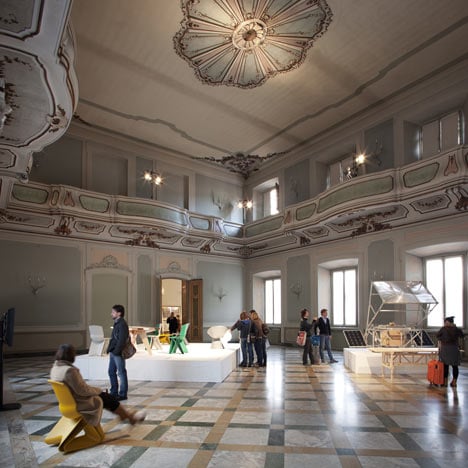
The Future in The Making: Open Design Archipelago
Milan 2012: in a Milanese palazzo this week Italian design magazine Domus presents an exhibition of open design and digital manufacture that puts control of production processes in the hands of designers and consumers.
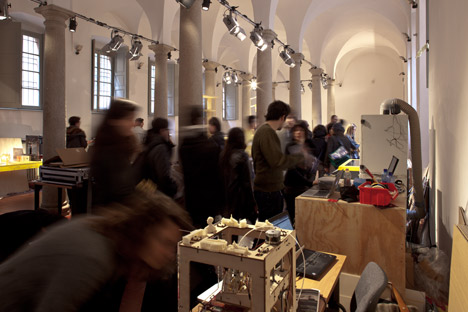
Called The Future in The Making: Open Design Archipelago, the show includes a working FabLab, one of a global network of small-scale workshops offering cutting-edge digital fabrication technologies like laser-cutters and 3D printers so customised products can be made locally, as and when they're required.
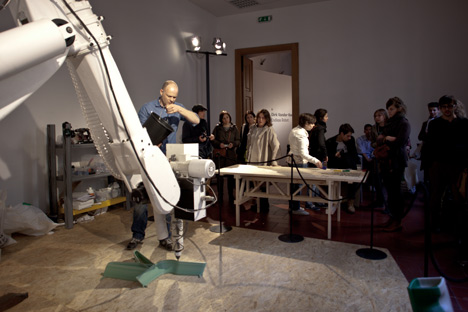
Dutch designer Dirk Vander Kooij demonstrates his Endless Robot that makes chairs out of recycled fridges (see our earlier story) and Markus Kayser's Solar Sinter machine that prints glass objects using just sunlight and sand in the desert (see our earlier story) is on show upstairs.
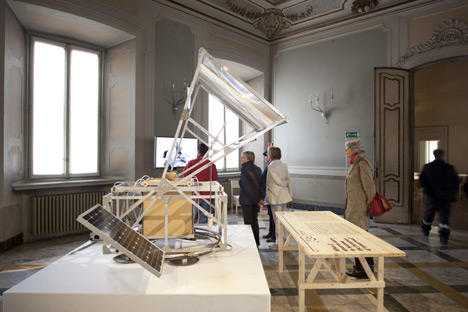
There's also a showcase of the best uses for Arduino open-source computer hardware, curated by Arduino founder Massimo Banzi, and a banqueting hall presenting 3D-printed food.
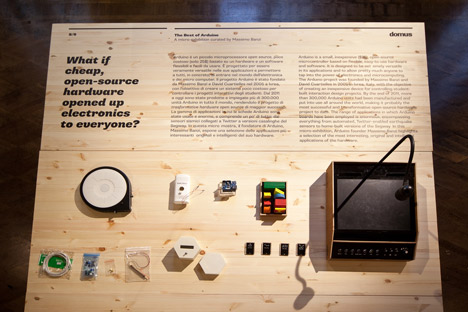
Designers taking back the means of production is one of the big stories in Milan this year - watch MoMA curator Paola Antonelli talking about this topic an more in today's TV show filmed at Dezeen Studio.
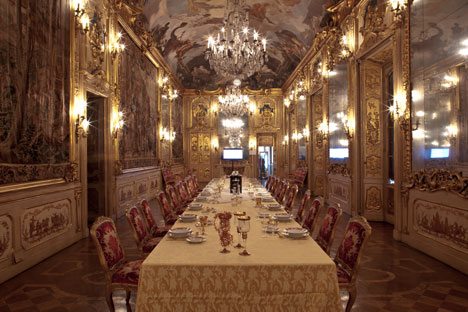
The Future in The Making continues at Palazzo Clerici, Via Clerici 5, Milano until 22 April.
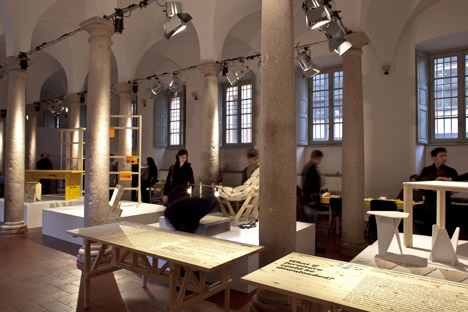
The Salone Internazionale del Mobile takes place from 17 to 22 April. See all our stories about Milan 2012 here.
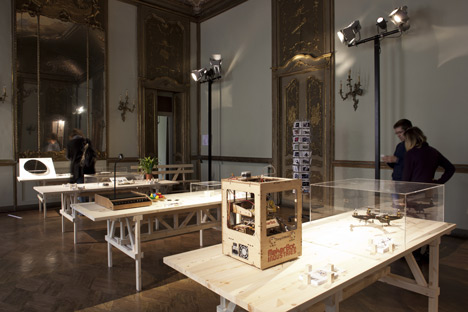
Here's some more information from Domus:
What if furniture were open source?
What if manufacturing were to be ubiquitous once again?
What if deserts were to become the factories of tomorrow?
What if income tax were to be replaced with tax on raw materials?
What if, instead of finished objects, designers were to conceive open evolutionary systems?
What if avant-garde gastronomy were the next frontier of 3D printing?
Design is on the move, all around us—an inescapable force defining every facet of 21st century existence. It is in the air, wirelessly weaving invisible networks of objects and people; on the street, empowering increasingly miniaturised and mobile devices; it is on the ground, building landscapes and shaping cities of the future.
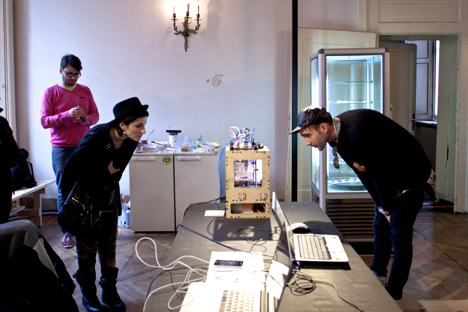
As design embraces the new technologies of the information age, design itself is being reshaped. Open Design Archipelago brings together a group of designers, practitioners, agencies and platforms that are - in different ways - responding through their work to these epochal changes and disrupting in the process the conventions and assumptions about design today. Some have built their practice around the collaborative ideology of the open source movement; others are exploring the countless opportunities opened up by low-cost, miniaturised electronics; others still are embracing the maker movement as a transformative force within established design practices, or tapping into the power of crowdfunding to make previously impossible ideas a reality. All, in one way or another, are fundamentally questioning the accepted established modes of practice within design, either by rethinking the economic models upon which it is founded, pushing the technological boundaries within which it operates or questioning the traditional top-down attitude of designers and manufacturers towards end-users.
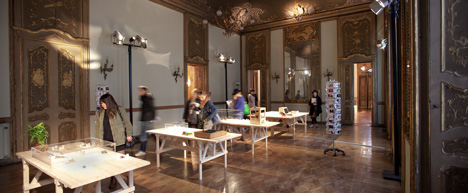
During Salone del Mobile 2012, Palazzo Clerici will become a transient laboratory of advanced experimentation and production in which Domus will explore the technological, material, philosophical and economic avant-gardes of contemporary design thinking. The iconic Finnish company Artek will be providing exclusive furniture for the Domus Design Archipelago from the line Autoprogettazione (1974) by the designer Enzo Mari.
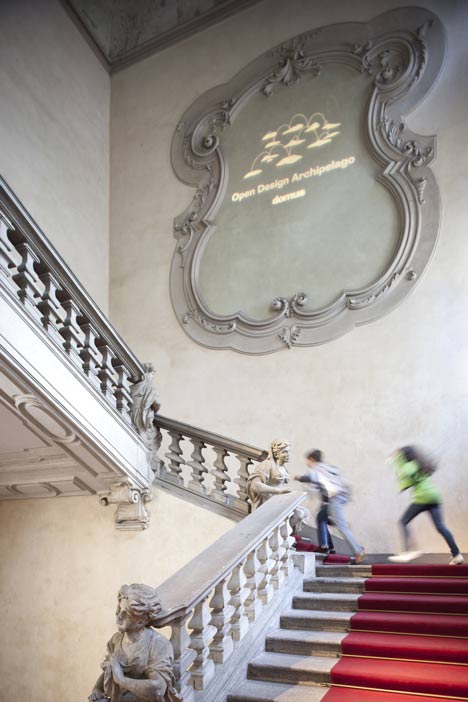
Autoprogettazione 2.0 - Open Source Furniture
In February 2012, Domus, in collaboration with FabLab Torino, invited designers, architects, students and professionals all over to participate in an open-source design challenge: conceive a line of furniture to be used in FabLabs all around the world that can be manufactured in the FabLabs themselves. FabLabs are a global network of small-scale workshops offering cutting-edge digital fabrication technologies to communities in dozens of cities and countries. The competition set out to explore how these fabrication technologies, combined with the networked creative talent of the design community, could open up new horizons in furniture design and manufacturing.
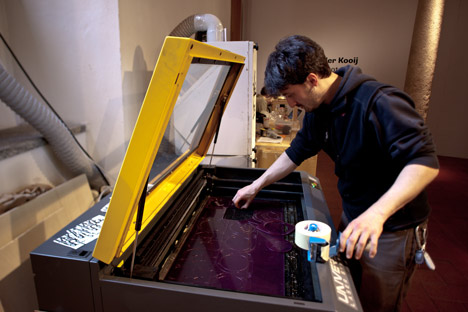
The title of the project is a homage to Autoprogettazione, a visionary concept proposed by Milanese designer Enzo Mari in 1974. Mari's now-legendary project consisted of a set of guidelines to create "cheap, high quality, long lasting and easy-to-assemble" furniture using only rough boards and nails. Autoprogettazione 2.0 is an invitation to consider the potential of a diffused, localised manufacturing network combined with the self-build ethos proposed by Mari for the future of furniture design. It is an open-ended call to action that seeks to leverage the combined intelligence and talent of the design community and collaborative, open-source networks of production.
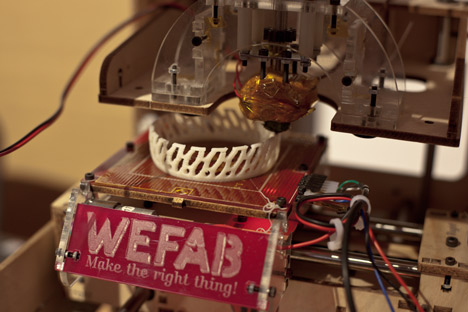
At Palazzo Clerici will be exhibited a selection of designs submitted in response to the call for ideas, selected by a jury consisting of Paola Antonelli (Curator, MoMA NY); Enrico Bassi (FabLab Torino); Massimo Banzi (Creator of Arduino; FabLab Torino); Joseph Grima (Editor, Domus); Clemens Weisshaar (Designer). All designs produced for Autoprogettazione 2.0 are released by Fablab Torino and Vectorealism under a Creative Commons license (Attribution-NonCommercial-ShareAlike CC BY-NC-SA).
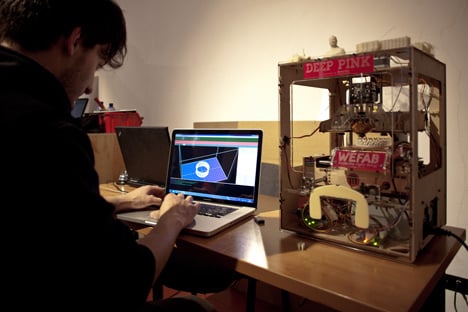
Dirk Vander Kooij - Endless Robot
Using a repurposed industrial robot that melts plastic obtained from recycled fridge components and deposits it in layers, Dutch designer Dirk Vander Kooij developed a new manufacturing technique inspired by 3D printing. Several years of experimentation led to the Endless series of chairs, tables and lamps, all of which are manufactured in his Eindhoven studio.
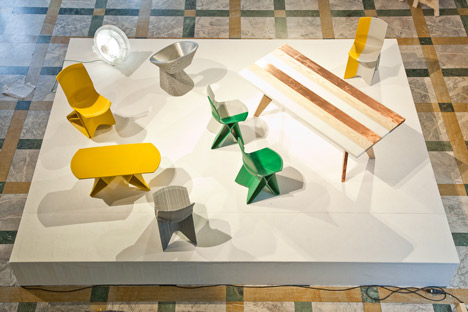
With a slow but extremely precise movement, the robot's arm progressively "prints" the objects layer by layer, depositing them like geological strata, and as a result, each one is almost unique in its colours and patterns. Swimming against the tide of mass-production, Vander Kooij repurposes advanced robotics technology to create a self-production facility: today his Eindhoven studio is a micro-industry capable of producing 4,000 units per year.
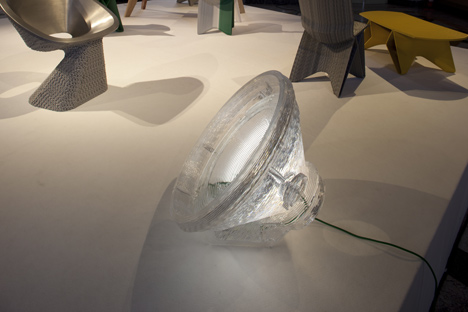
Markus Kayser - SolarSinter
In a world increasingly concerned with questions of energy production and raw material shortages, the work of Markus Kayser explores the potential of manufacturing in the desert, where energy and material are present in abundance. With his experimental SolarSinter Project, sunlight and sand are used as raw energy and material to produce glass objects using a 3D printing process that combines natural energy and material with advanced production technologies.
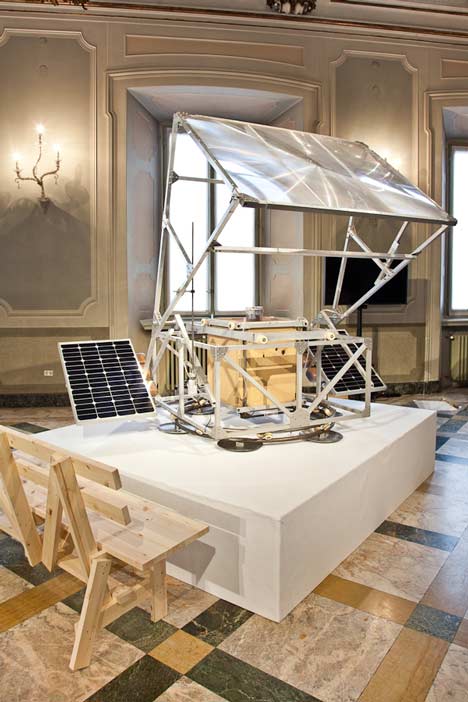
Solar-sintering aims to raise questions about the future of manufacturing and triggers dreams of the full utilisation of the production potential of the world’s most abundant energy resource - the sun. Whilst not providing definitive answers, this experiment aims to provide a point of departure for fresh thinking on how architecture. The objects on display at Palazzo Clerici were produced during an expedition to the Moroccan desert in March-April 2012.
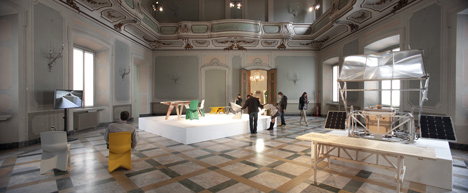
Droog - Material Matters: Future Furniture Fair
Our economic system is in turmoil. Our resources are becoming scarce. In the meantime, we stick to the same economic models, producing more products, producing more waste.
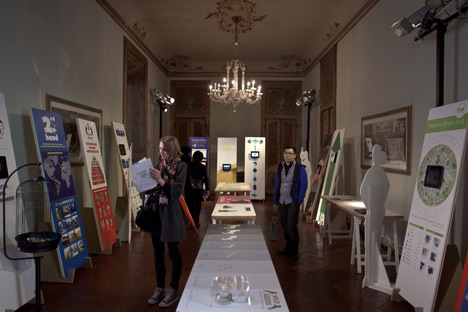
What if, in an alternative economic model, income tax were to be replaced with tax on raw materials? What would this mean for the design industry? Will designers offer alternative ways of creating materials, will they specialize in upcycling, concentrate on services, go digital, or do something else? At Palazzo Clerici the exhibition “Material Matters: a future furniture fair” features 20 design companies—both real and imagined—that might come to thrive given the change in policy.
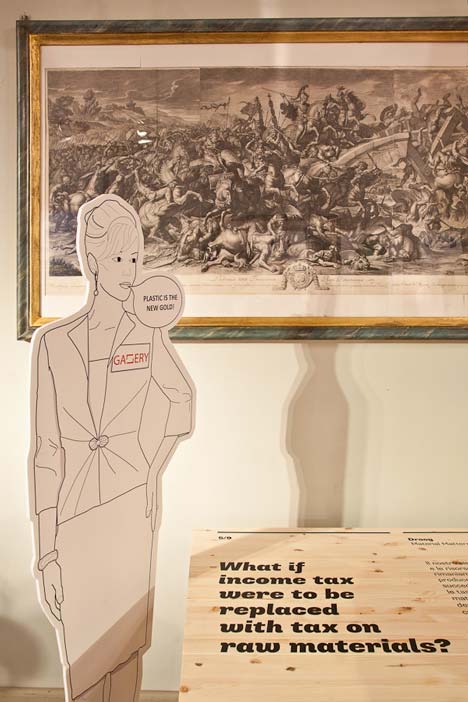
Kickstarter.com - Crowdfunding
Every week, tens of thousands of people pledge millions of dollars on Kickstarter.com, a crowd-funding platform that is revolutionising the way in which journalists, artists, musicians, game developers and entrepreneurs finance their work. Following three years of vertiginous growth (the site went online in 2009), Kickstarter is expecting to raise more than $150 million for its users’ projects in 2012. That amounts to $4 million more than the entire fiscal year 2012 budget for the National Endowment of the Arts, the federal government agency that funds artistic and creative projects in the US.
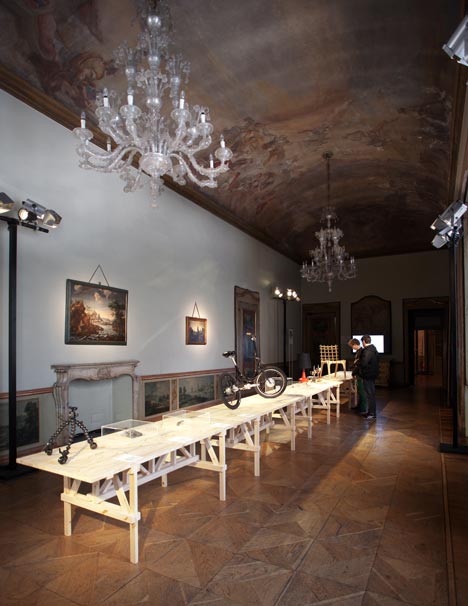
One of the most significant areas of growth of Kickstarter is the funding of industrial design: the first Kickstarter campaign to collect a total of more than $1 million in pledges was barrier was an iPod dock (the campaign ended in February 2012). The industrial production of all the items on display here was funded through Kickstarter, and all are self-produced by the designers themselves.
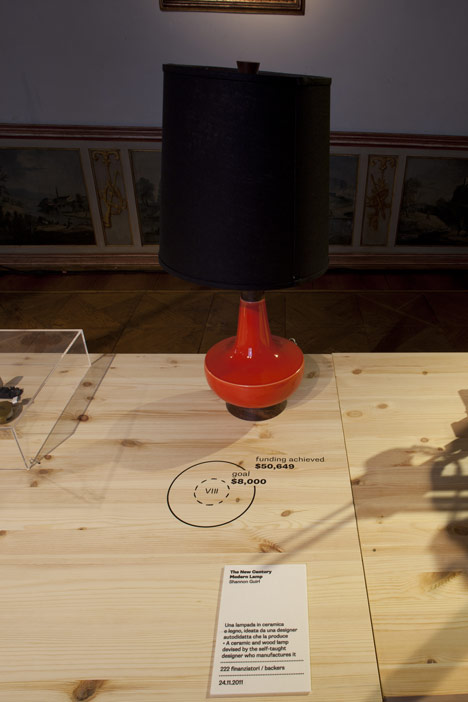
Just one month later, in March 2012, a new funding record was established: $3 million, collected by the videogame Double Fine Adventure.
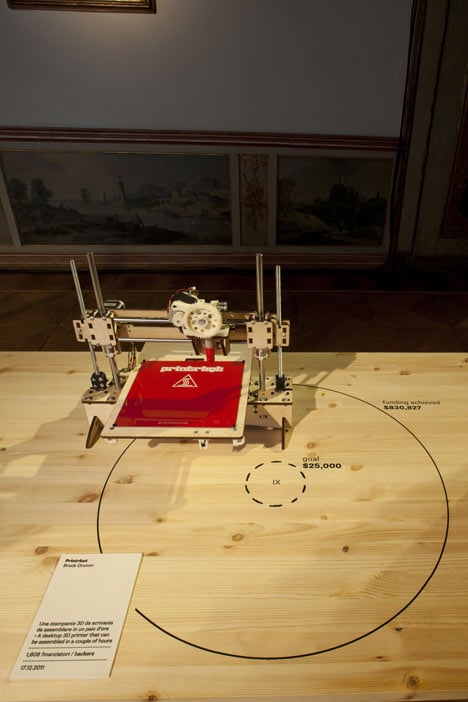
Thomas Lommée - OpenStructures OS BIKE (2009 – 2012)
The OS (OpenStructures) project explores the possibility of a modular construction model where everyone designs for everyone on the basis of one shared geometrical grid. It initiates a kind of collaborative, functional Meccano to which everybody can contribute parts, components and structures. The possible results range from coffee makers to furniture systems and from tools to bicycles.
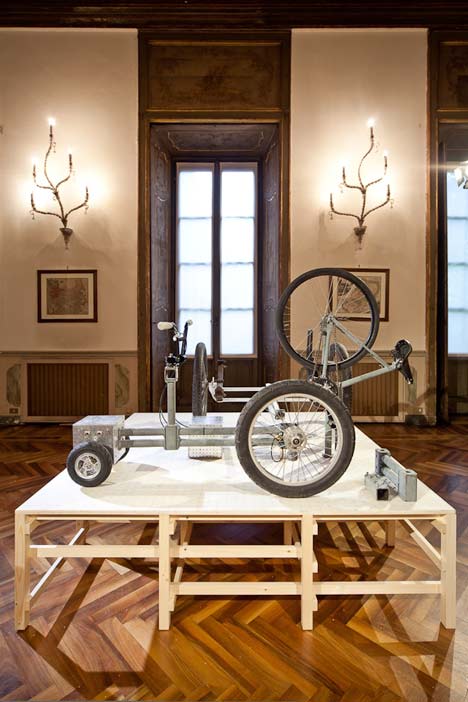
The ultimate goal is to initiate a universal, collaborative puzzle that allows the broadest range of people – from craftsmen to multinationals – to design, build and exchange the broadest range of modular components, resulting in a more flexible, adaptable and scalable built environment. The project also raises, however, certain crucial questions regarding the future of collaborative design: How do we credit contributors? How do we generate money? And, last but not least, how do we balance openness and protection, freedom and restriction?
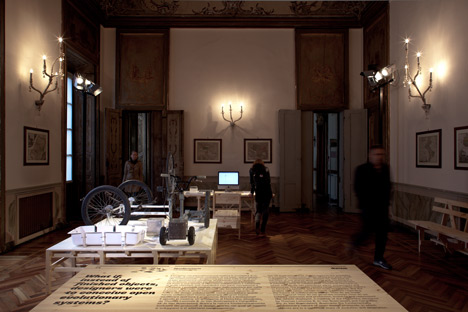
The vehicle displayed at Palazzo Clerici, a mashup of the Motorbloc (designed by Thomas Lommée + Jo Van Bostraeten) and CargoBike (by Jo Van Bostraeten), illustrates the fundamentally evolutionary nature of open design protocols, in which objects are in a continual state of evolution and adaptation.
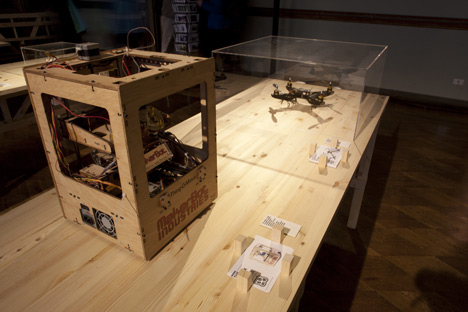
The Best of Arduino - Una micro-mostra curata da Massimo Banzi
Arduino is a small, inexpensive ($25), open-source microcontroller based on flexible, easy-to-use hardware and software. It is designed to be extremely versatile in its applications and to allow pretty much anyone to tap into the power of electronics and microcomputing.
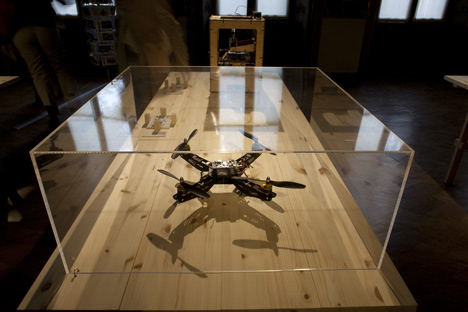
The Arduino Project was founded by Massimo Banzi and David Cuartielles in 2005 in Ivrea, Italy, with the objective of creating in inexpensive device for controlling student-built interaction design projects. By the end of 2011, more than 300,000 Arduino units had been manufactured and put into use all around the world, making it probably the most successful and transformative open source hardware project to date. The range of applications Arduino boards have been employed in is enormous, encompassing everything from automated, Twitter-enabled earthquake sensors to home-built versions of the Segway.
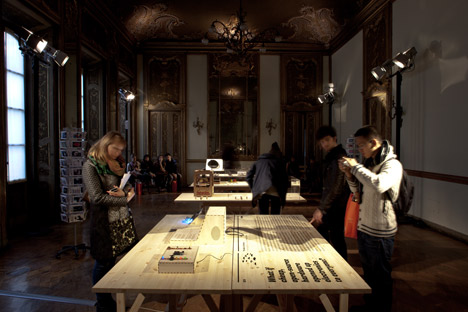
At Palazzo Clerici Arduino founder, Massimo Banzi, highlights with a microexhibition a selection of the most interesting, original and intelligent applications of the hardware.
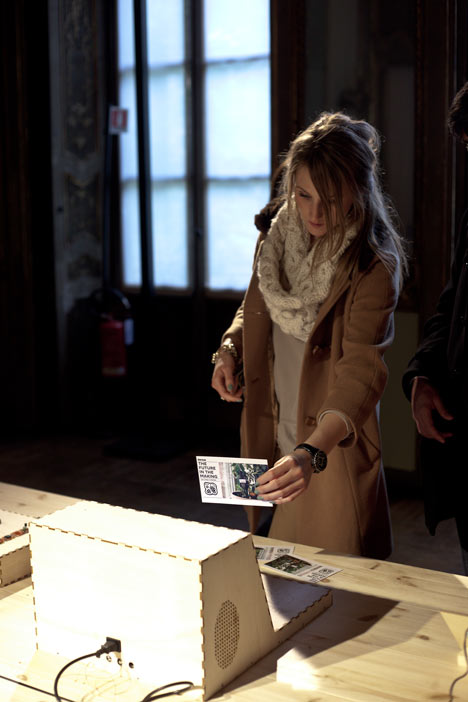
GGLAB (Green Geometries Laboratory) + Deniz Manisali - FoodPrinting
Traditional gastronomy operates by establishing a tension between natural and artificial, between single ingredients and their transformation into a gastronomic experience both in terms of aesthetic and taste. By offering chefs and food designers a new and versatile instrument for the manipulation of ingredients, 3D printers open up an unexplored frontier, an opportunity to intensify this tension. They beart the promise of an increased control over form and an enhanced ability to design taste—and when coordinated with sensorial monitoring could open up a completely new way of cooking.
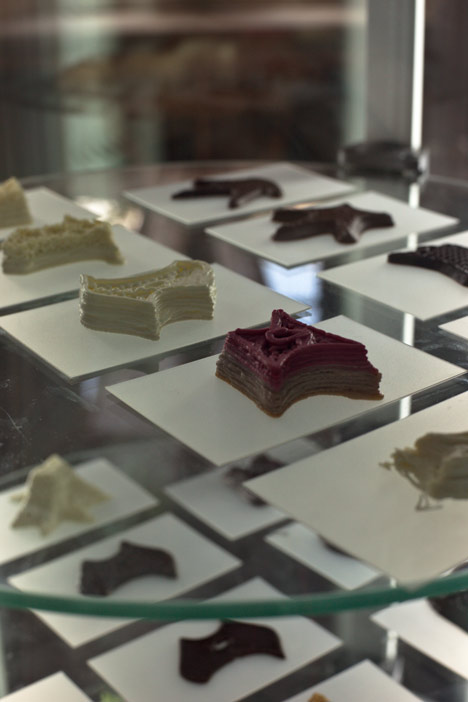
Over the last two years the Spanish architecture practice GGLAB, in collaboration with IAAC - Institute for Advanced Architecture of Catalonia and chef Paco Morales, has experimented with the application of 3D printing in avant-garde gastronomy, testing the possibilities of this new realm of design.
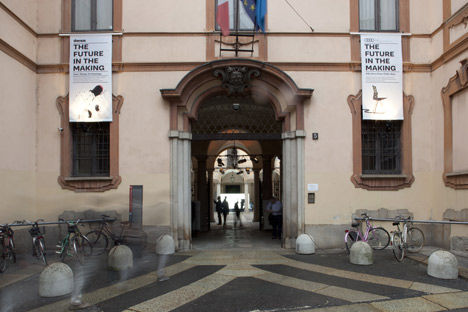
Movie: Joseph Grima at Dezeen Studio
.
Update 01/05/12: editor-in-chief of Domus magazine Joseph Grima discusses end-user collaboration and open-source production in the interview we filmed at Dezeen Studio.